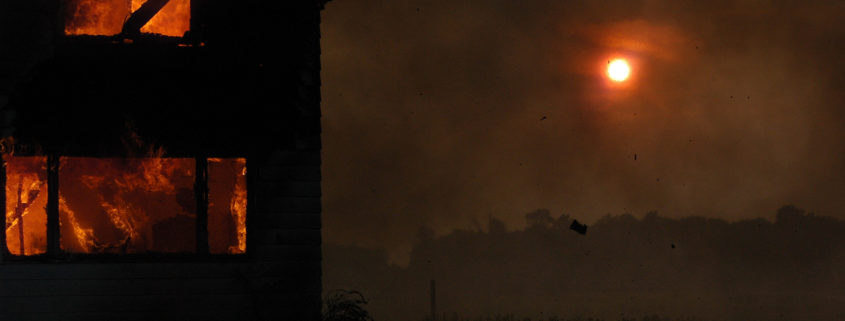Home Disaster – Tips to Help Mitigate Damage
None of us are immune to accidents – even catastrophic ones. There are ways, however, to help you minimize the damage when it comes to home disaster.
You only have to watch the evening news or peruse your social media feed, to see what seems a never-ending stream of disasters, tragedies, and environmental apocalyptic predictions involving environmental collapse and climate change.
Disasters such as earthquake, hurricane, tornado, or other natural catastrophe is what most often comes to mind. But, chances are, when it comes to your life and your home, you’re far more likely to be the victim of a more localized occurrence such as water, fire, or damages due to burglary or vandalism.
One familiar line should prevail (thank you, Boy Scouts Handbook): Be Prepared. A simple concept, yes, but for many of us, not the easiest advice to heed.
We’re here to tell you — listen to the Boyscouts! And take our advice as well: begin planning for an emergency well before it happens. It’s those common residential disasters – even when small – that can cause such significant damage, often requiring expensive restoration. For most of us, the most likely disasters resulting in damage are:
- Water damage: broken pipes, sewage backups, flooding – overland, rain, and snow – can cause considerable stress, expense, and destruction.
- Damage due to Fire & Smoke: fires, even smaller ones, can cause all manner of damage. Don’t forget damage from smoke – it can often leave homes or buildings completely uninhabitable.
- Burglary and/or Vandalism: let’s face it, most thieves aren’t going to care if they damage your property as they steal your belongings. along with stolen property, you’ll likely have to deal with the havoc they’ve wreaked on your home.
- Mould, Lead, Asbestos: these environmental hazards are often largely undetectable to an untrained eye and make for a very unhealthy living environment. They’re also quite dangerous to remove. Enlist the pros to rid your home of asbestos and other toxic and hazardous materials.
- Grow-op Abatement: a bain of landlords, dealing with the considerable impact of tenants who have contaminated rental properties with chemicals and mould, related to their troublesome and illegal drug operations.
- Wind & Storm: fallen trees and other flying debris are a common byproduct of high winds and storms. They can cause structural damage to a home requiring significant and costly repairs.
- Trauma Incidents: gross but sometimes necessary – the safe cleanup and removal of blood and other bodily fluids.
Recommendation: call a restoration company right after you’ve been in contact with your insurance provider. Your broker will work to get the restoration underway with the best claims coverage based on the insurance policy. A quick response is very important to prevent any further damage.
To learn more about damage prevention, CONTACT US; we have the knowledge and expertise to advise you on all aspects of protecting your home BEFORE a disaster occurs.
As they say, “An ounce of prevention…”
Preventative maintenance can provide a much more rapid restoration result. Mitigate the extent of the damage and the time it takes to get your restoration completed… before a disaster even happens!
Tips for preventing damage from water
Prevent water damage:
- By being aware of where all your shut-off valves are throughout your home.
- Do not run your dishwasher or washing machine when you’re away from home.
- Regularly check all of your toilets for leaks. You want to check supply lines for wear, age, wear, and possible leaks. If there is any sign of water leakage around the base, turn off the valve.
- Be sure to do a regular inspection of any other water-related appliances – includes refrigerators (particularly if there’s an ice-maker) and dishwashers. Inspect the hoses occasionally.
- Check your drains indoors and out to make sure they’re operating properly.
- Inspect your gutters. Clear them of debris if it’s collected. Check your downpipes to make sure they’re properly connected and directed.
- During colder months, check eavestroughs and downspouts for ice and other debris to avoid any chance of ice damming and damage.
- Winter maintenance should include shutting off all water to outdoor hose bibs.
Don’t forget to inspect your hot water tank
- If your water tank is 7 years or older it should be regularly inspected for leaks and stains.
- If your tank doesn’t have a drip tray, be sure to have one installed with a proper run-off to the floor drain.
- check the pressure relief valve (PR Valve) for proper operation and function. It will automatically open if the pressure in the tank exceeds the allowable limit.
Fire damage
Fire is devastating and can destroy an entire home in mere moments. The best prevention is to check your home to ensure it’s clear of major fire hazards:
- Have all electrical inspected before you purchase a new home.
- Check and test your smoke detectors regularly – be sure they work!
- Unplug your small appliances when they’re not in use.
- One that often gets overlooked: clean the lint filter of your dryer on a regular basis. Consider having the dryer vent system inspected and cleaned by a professional anually.
Vandalism
Often when a break-and-enter occurs, it is less about what’s been stolen than the damage done while thieves are on the hunt for valuables. They want to get in and out in a hurry, and, in the process, often create costly damage – often worth more than the value of the stolen goods.
- Make sure slideing doors are equipped with a lock that can’t be pried open.
- Check that you have proper locks and that they work on all potentially accessible windows – check regularly that they’re still effective.
- Install a monitored or non-monitored security system.
- Do not leave your valuables in plain sight. Have a safe place to keep your laptop and other high-end electronics when you leave the house.
- When you’re getting ready for a trip, follow best practices as you should prepare to leave your home if it will be unoccupied for more than a day.
- Check out this list of tips to protect your home from a break-in.
Environmental hazards and materials
It may come as a surprise, but biohazards can occur at any time. They can exist in your older home or be the unfortunate result of a catastrophic event.
Proper detection of biohazards is vital as it can help you get out ahead to prevent potentially serious health risks. When purchasing a new property be sure to have the home inspected before you purchase; ask questions about the history of the home – the year it was built and what materials were used; if this information is known; have an air quality test performed, particularly if you have severe allergies or are vulnerable to illness.
If you are a landlord inspect your properties on a regular basis, according to the law.
Concerns to look for:
- Construction that may include lead and asbestos.
- Signs of mildew and mould.
- Signs of a grow op or other illegal drug operation.
- Vermin infestation (mice, rats, bats, raccoons, squirrels).
Protect your valuables before the disaster
It’s not unusual that over time we become rather complacent about our valuables – items such as jewelry, art, fine wine, and important documents, for example. But, there are also those things that have significant sentimental value as well – photos and meaningful family mementos. Check out the tips below to help keep your most precious belongings safe from fire, flood, and vandalism:
1. Inventory your belongings and keep it updated.
2. Keep photocopies or digital records of your important papers such as passports, birth certificates, taxes, and credit cards. Store them in a safe deposit box at a bank.
3. In a flood, hurricane, tornado, or high fire risk area? Take photos and make photo books of your children’s’ art, treasured photographs, and any family heirlooms. Make copies and be sure to store one with a family member or friend and keep another in a safety deposit box.
4. For items you need on a regular basis – passport, if you travel frequently – get a small, durable, fireproof safe and lock up valuables at home.
5. Store any paper valuables off the floor in a waterproof bin. Water damage is one of the major causes of insurance claims and this small step can help preserve important documents, books, or other paper valuables.
To learn more about damage prevention, CONTACT US; we have the knowledge and expertise to advise you on all aspects of protecting your home BEFORE a disaster occurs.



